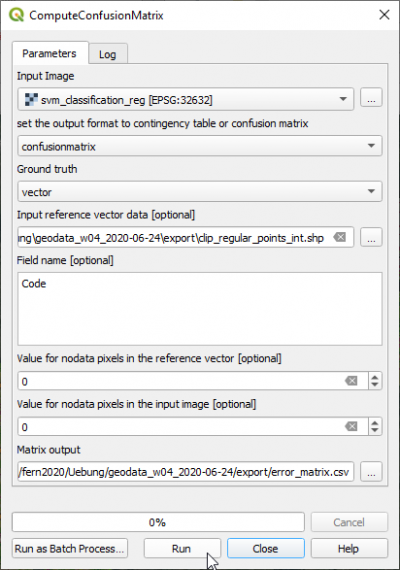Map validation
From AWF-Wiki
(Difference between revisions)
(→QGIS Processing toolbox with OTB plugin) |
(→QGIS Processing toolbox with OTB plugin) |
||
| Line 1: | Line 1: | ||
=== QGIS Processing toolbox with OTB plugin === | === QGIS Processing toolbox with OTB plugin === | ||
| − | # Type into the search box of Processing tools | + | # Type into the search box of Processing tools {{typed|text=Confusion}} and double click '''ComputeConfusionMatrix'''. |
# Set the classified map as {{button|text=Input image}}. | # Set the classified map as {{button|text=Input image}}. | ||
# Select the output file name with the extension '''.csv''' under {{button|text=Matrix output}}. | # Select the output file name with the extension '''.csv''' under {{button|text=Matrix output}}. | ||
| − | # The | + | # The validation data can be in vector or raster format. Select {{button|text=Ground truth as vector data file}}. |
# Set the validation '''CE_2020-01-03.shp''' as {{button|text=Input reference vector data}}. | # Set the validation '''CE_2020-01-03.shp''' as {{button|text=Input reference vector data}}. | ||
# Select the Field name '''valid_clas'''. | # Select the Field name '''valid_clas'''. | ||
Revision as of 16:27, 5 January 2020
QGIS Processing toolbox with OTB plugin
- Type into the search box of Processing tools Confusion and double click ComputeConfusionMatrix.
- Set the classified map as Input image.
- Select the output file name with the extension .csv under Matrix output.
- The validation data can be in vector or raster format. Select Ground truth as vector data file.
- Set the validation CE_2020-01-03.shp as Input reference vector data.
- Select the Field name valid_clas.
- Click Run.
- Open the CSV output file with Libre Office Calc or MS Excel. Calculate User accuracies, Producer accuracies, Overall accuracy and Kappa index.
